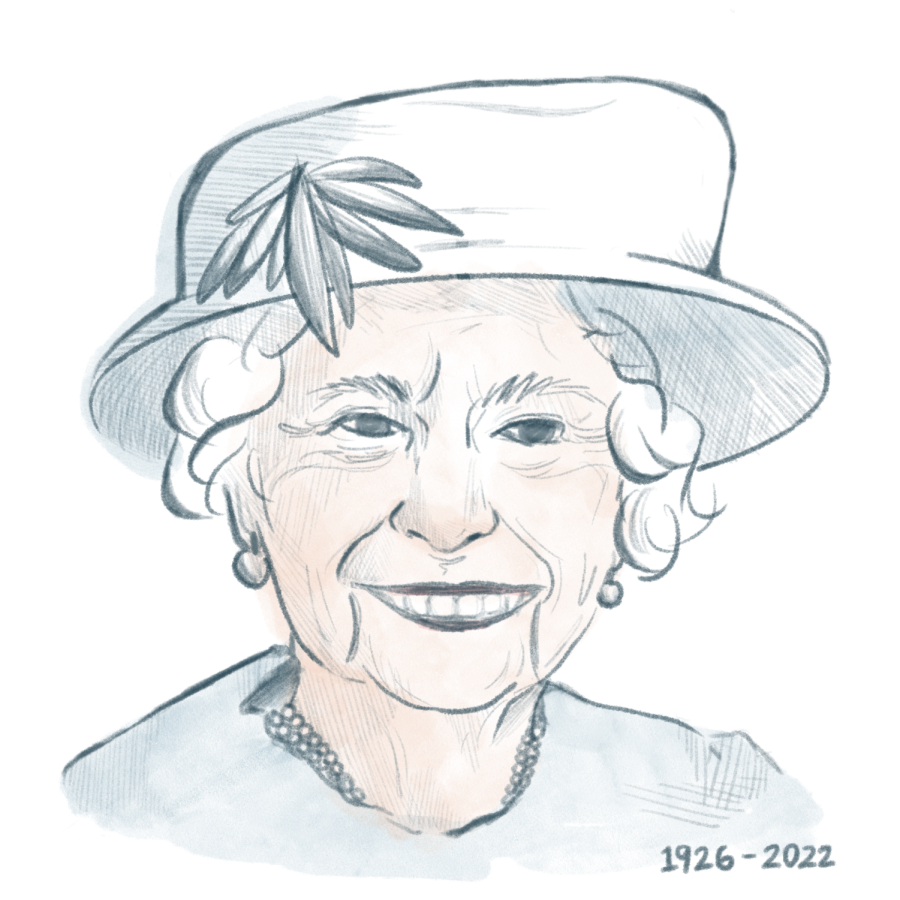London Bridge Is Down: The Procedure for the End of a Monarchy
October 6, 2022
“A few moments ago, the Buckingham Palace announced the death of Her Majesty Queen Elizabeth II,” reported BBC newsreader Huw Edwards as the weather switched between sunshine and showers, casting rainbows above the Palace. On September 8th at 6:30 pm, Buckingham Palace announced in a tweet that Queen Elizabeth II had passed away at Balmoral Castle in Aberdeenshire, Scotland. The cause was not specified, although it was reported that she was under medical attention during the hours before her passing. Her death brought an end to the longest monarchy in British history, which lasted 70 years and 214 days. The passing of Queen Elizabeth was long anticipated due to various pre-existing health issues, including her contracting of COVID-19 in April of this year. Nonetheless, the news caused a wave of shock across the world and a myriad of reactions.
As King Charles III prepared to assume the throne, many took the time to spark conversations about the royal family’s controversial past, and their contributions to colonialism. In particular, Armenian Garabed Kalajian ’25 expressed to the Register Forum that he is “greatly disappointed at the Queen’s efforts to recognize the Armenian Genocide in 2015,” in reference to the genocide of 1915 which world leaders including Britain failed to classify as such in order to sidestep tensions with Turkey. Countless others mourned the loss of who was to them a comforting figure, representing the values of the Commonwealth while transcending partisan views.
What would you do if you knew the exact events following the days, hours, minutes after your death? It appears that to the UK government, the Queen’s death might have been more anticipated than we thought. Dating back as early as the 1960s, a plan called “Operation London Bridge” was created and constantly revised until the day of the Queen’s passing. Operation London Bridge, alongside Operation Unicorn, yes, for handling her passing in Scotland, and Operation Overstudy if she were to pass outside the UK, was essential not only to make suitable funeral arrangements, but to ensure a peaceful transition of power. It includes the meticulous procedures and actions that the royal circles, officials, and employees must follow to guarantee an undisturbed sendoff.
The phone rings in the Prime Minister’s office. “London Bridge is Down,” a voice utters. The phone clicks, and the plan has officially been initiated. The flags must be lowered to half-mast within 10 minutes of the announcement, to avoid public outcry. Based in an undisclosed location, the Foreign, Commonwealth and Development Office’s Global Response Centre relays the information to the fourteen governments of the Commonwealth realms. British media is informed through the Radio Alert Transmission System, which utilizes a network of “obit lights” that signal BBC of the death of a royal family member. News agencies suspend regular broadcasting and air a pre-recorded series of visuals of the former Queen, while dressing in previously prepared dark clothing before making an official announcement to the world.
When regarding the considerable amount of attention and meticulous planning towards this global event, CRLS junior Kiri-Anna Kingsbury-Lee tells the Register Forum, “I don’t think it’s necessary anymore considering the amount of power the monarchy has in comparison to the Parliament and Prime Minister, but I do think it is important to acknowledge how important a figure the Queen was for all people in the UK, especially considering they just got a new Prime Minister who is less than stable.” Ido Kirson ’25 shares a similar view, stating, “I think that in this day in age, for people to still be worshiping one person as if they are a god, especially when they are such a terrible person is something that we should be past. We’re in the 21st century, [we should be] holding them accountable, especially taking so long after coming into power to dismantle their empires.”
The UK embarked on a ten-day mourning period before her funeral at Westminster Abbey on Monday, September 19th, which was declared a bank holiday as various businesses and schools close as a token of respect. Britain’s inhabitants look toward the future, ringing in a new era of hope and progress.
This article also appears in our September 2022 print edition.











